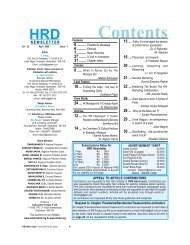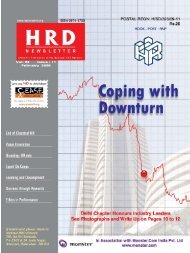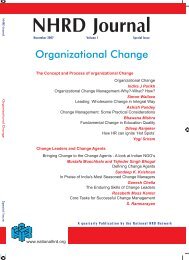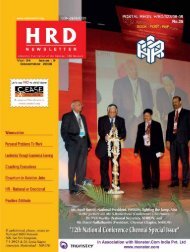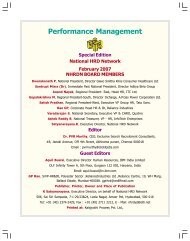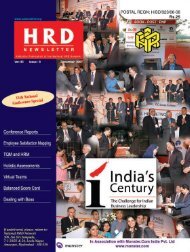NHRD April 2013.pdf - National HRD Network
NHRD April 2013.pdf - National HRD Network
NHRD April 2013.pdf - National HRD Network
Create successful ePaper yourself
Turn your PDF publications into a flip-book with our unique Google optimized e-Paper software.
traceable to its source of origin. Brands<br />
need to be visible, identifiable, relatable;<br />
but these are attributes it must possess,<br />
they do not describe what the brand<br />
fundamentally is. The value that branding<br />
creates is an providing an additional<br />
layer of meaning to things that makes it<br />
distinctive,; it is the difference between<br />
flavored carbonated water and Coca-Cola<br />
and between Coca-Cola and Pepsi.<br />
The common understanding of branding<br />
as self-conscious promotion obscures this<br />
vital aspect of branding. Which is why<br />
so many so-called brands look, feel and<br />
sound the same. The problem is much more<br />
acutely felt in the case of the organization<br />
brands. Examine the alleged driver of these<br />
companies, their vision statement and you<br />
will find that most of them are versions<br />
of a desire ‘to be and to be recognized as<br />
the best provider of the best products and<br />
services providing the best environment<br />
for the employees to be at their best.’ In<br />
many ways, the mindless adoption of best<br />
practice is the opposite of branding; for<br />
every organization must find its own best<br />
practice rather than case the best practice,<br />
which by definition cannot be branded as<br />
your own. The idea that there is a mythical<br />
ideal way of dealing with employees that<br />
everyone must strive to emulate makes a<br />
mockery of the idea of branding.<br />
In that sense, the brand is the essential<br />
nature of a product, service or idea; the<br />
reason for the Coke-ness of Coke or the<br />
Infosys-ness of Infosys. When we talk of<br />
a company brand for instance, there is a<br />
common set of images and associations<br />
that come to our mind. If we were to dig a<br />
little deeper, we could, particularly in the<br />
case of strong brands, be able to identify<br />
a strong driving idea that produces these<br />
associations and images. Apple might<br />
be seen as an innovative company with<br />
a deep understanding of the power of<br />
design, but its core idea has to do with<br />
its radically new imagination of what a<br />
machine is. The idea that machines do<br />
not merely produce work and reduce<br />
human labour but instead actively spark<br />
the human imagination and enable us to<br />
experience life in a new way, is what drives<br />
everything that Apple does. All its actions<br />
including the configuration of its product<br />
offerings, the lucid beauty of its designs,<br />
its desire to create closed ecosystems<br />
that respect individual brilliance, its<br />
advertising and promotional programmes,<br />
the work culture that combines creativity<br />
with driving pressure- all of these can be<br />
traced to the idea that drives the brand.<br />
The strongest brands in the world are<br />
based on powerful ideas that connect<br />
with some fundamental human truth.<br />
And communicated as powerful mythical<br />
stories that we want to hear.<br />
A brand derives its meaning from many<br />
sources, but all of them need to act in<br />
ecological unison to produce the final<br />
effect. Nothing lies outside the brand,<br />
nothing can be excluded from its ambit. It<br />
is by harnessing all the elements in the mix<br />
that a brand truly comes alive. The idea<br />
that the brand is ‘owned’ by the marketing<br />
function, is thus patently absurd. Since the<br />
brand is much more an articulation of an<br />
internal truth, its ownership lies with all<br />
stakeholders of the business. Marketing<br />
leads its interaction with consumers, just<br />
as finance would manage the organization<br />
brand for its constituency. It is only when<br />
we detach branding from marketing that<br />
its full power can be unleashed. That is<br />
not to say that Marketing is not critical<br />
in managing the brand only that the<br />
presumed synonymity that the two enjoy<br />
needs to be challenged.<br />
20<br />
<strong>April</strong> | 2013 <strong>N<strong>HRD</strong></strong> <strong>Network</strong> Journal




